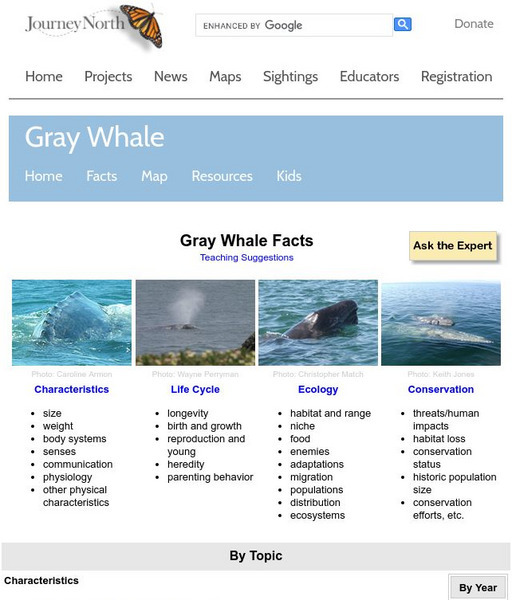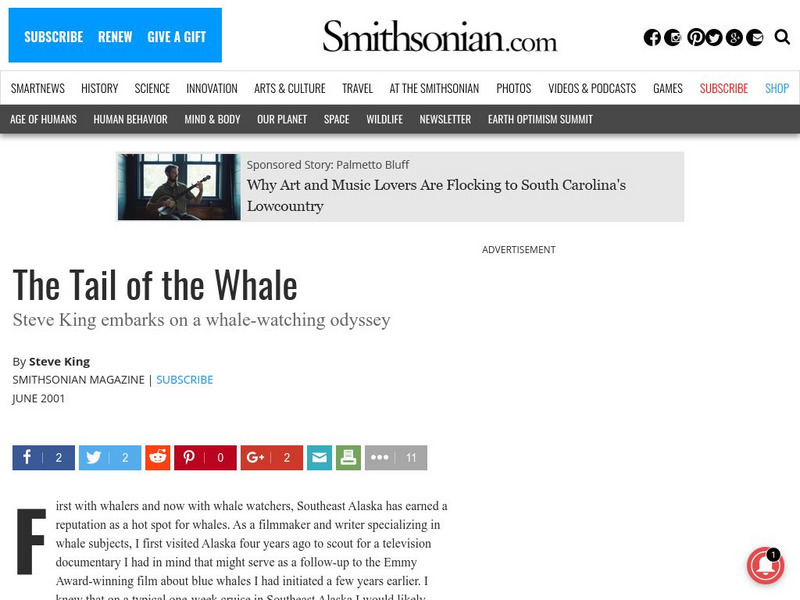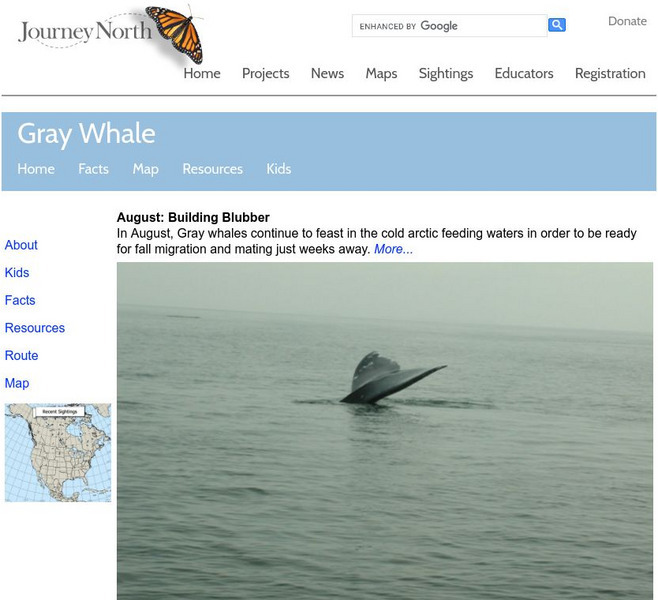Annenberg Foundation
Annenberg Learner: Journey North: Gray Whales
A comprehensive presentation that answers a number of questions about gray whales. In addition, there are challenge questions, lessons, and activities that can be used in the classroom. the migratory pattern of this whale is also tracked.
Alabama Learning Exchange
Alex: Is That a Whale?
This lesson will increase student knowledge of whale anatomy and habitat while using the Internet for information gathering.
PBS
Pbs Teachers: The Great Whales: Make a "Blubber Glove"
Examine the whale's layer of insulating fat, known as blubber, and test the effectiveness of fat as an insulator. Discuss how humans use insulating materials to protect themselves from exposure to cold temperatures.
Rock ’N Learn
Rock 'N Learn: Whispering Whales
This printable letter worksheet from Rock 'N Learn can be used as a reinforcement activity or as an assessment. Students will look for hidden words that start with the /wh/ digraph. An answer key and lesson extension are included.
MarineBio Conservation Society
Marine Bio: Andrew's Beaked Whales
Discover useful information about Andrew's beaked whales including description, behavior, range, habitat, diet, breeding, and conservation status.
MarineBio Conservation Society
Marine Bio: True's Beaked Whales
Illustrated reference guide features useful information on True's beaked whales with facts on physical characteristics, behavior, range, habitat, diet, and conservation status.
MarineBio Conservation Society
Marine Bio: Stejneger's Beaked Whales
Illustrated reference guide features useful information on Stejneger's beaked whales with facts on physical characteristics, behavior, range, habitat, diet, and conservation status.
MarineBio Conservation Society
Marine Bio: Sowerby's Beaked Whales
Illustrated reference guide features useful information on Sowerby's beaked whales with facts on physical characteristics, behavior, range, habitat, diet, and conservation status.
MarineBio Conservation Society
Marine Bio: Hubbs' Beaked Whales
Illustrated reference guide features useful information on Hubbs' beaked whales with facts on physical characteristics, behavior, range, habitat, diet, and conservation status.
MarineBio Conservation Society
Marine Bio: Hector's Beaked Whales
Illustrated reference guide features useful information on Hector's beaked whales with facts on physical characteristics, behavior, range, habitat, diet, and conservation status.
MarineBio Conservation Society
Marine Bio: Ginko Toothed Beaked Whales
Illustrated reference guide features useful information on Ginko-toothed beaked whales with facts on physical characteristics, behavior, range, habitat, diet, and conservation status.
MarineBio Conservation Society
Marine Bio: Gervais' Beaked Whales
Illustrated reference guide features useful information on Gervais' beaked whales with facts on physical characteristics, behavior, range, habitat, diet, and conservation status.
MarineBio Conservation Society
Marine Bio: Cuvier's Beaked Whales
Discover useful information about Cuvier's beaked whales including description, behavior, range, habitat, diet, breeding, and conservation status.
MarineBio Conservation Society
Marine Bio: Blainville's Beaked Whales
Discover useful information about Blainville's beaked whales including description, behavior, range, habitat, diet, breeding, and conservation status.
MarineBio Conservation Society
Marine Bio: Baird's Beaked Whales
Discover useful information about Baird's beaked whales including description, behavior, range, habitat, diet, breeding, and conservation status.
MarineBio Conservation Society
Marine Bio: Arnoux's Beaked Whales
Discover useful information about Arnoux's beaked whales including description, behavior, range, habitat, diet, breeding, and conservation status.
Georgia Aquarium
Georgia Aquarium: Whale Shark
Use this animal guide to learn the scientific name and discover the habitat, diet, reproduction, conservation status, physical, and other unique characteristics of the Whale Shark. They can be viewed live on the webcam.
ReadWriteThink
Read Write Think: Reading/writing About Whales Using Fiction and Nonfiction Texts
Students will have a whale of a good time in this lesson in which they use fiction and nonfiction texts to write a letter to an online scientist.
NOAA
Noaa: Pmel: Acoustic Monitoring, Bioacoustics
Outlines the National Marine Mammal Laboratory's project studying whale acoustics (the sounds whales make). Links to clear acoustics tutorial. Also includes whale biology, with acoustic descriptions and sound clips of their calls. Very...
Smithsonian Institution
Kids'castle: The Tail of the Whale
A great article abstract about Orca whales. Use this site to learn how whales travel great distances, and about the personal struggle of one baby orca.
Annenberg Foundation
Annenberg Learner: Journey North: Gray Whales
Track gray whale migration. Use live data to observe migration patterns.
Other
Whale Net: Satellite Tagging Data, Maps and Information
Information on what satellite tags are, how they work, and how they are used for research on whales. Also discusses several studies they have done using this equipment, and how this information can be used in conservation work. Great...
ClassFlow
Class Flow: All About Whales
[Free Registration/Login Required] The objective of this lesson about whales is to learn about the differences between mammals and fish using the Venn diagram. The lesson also covers charting animal sizes and ends with a 10-question...
Smithsonian Institution
National Museum of Natural History: American Mammals: Sei Whale
Unlike other rorquals, Sei whales have a dolphin-like dorsal fin. They are also unusual in using two different methods to fill their mouths with water during feeding - they both gulp and skim-feed. Learn more about the Balaenoptera...











